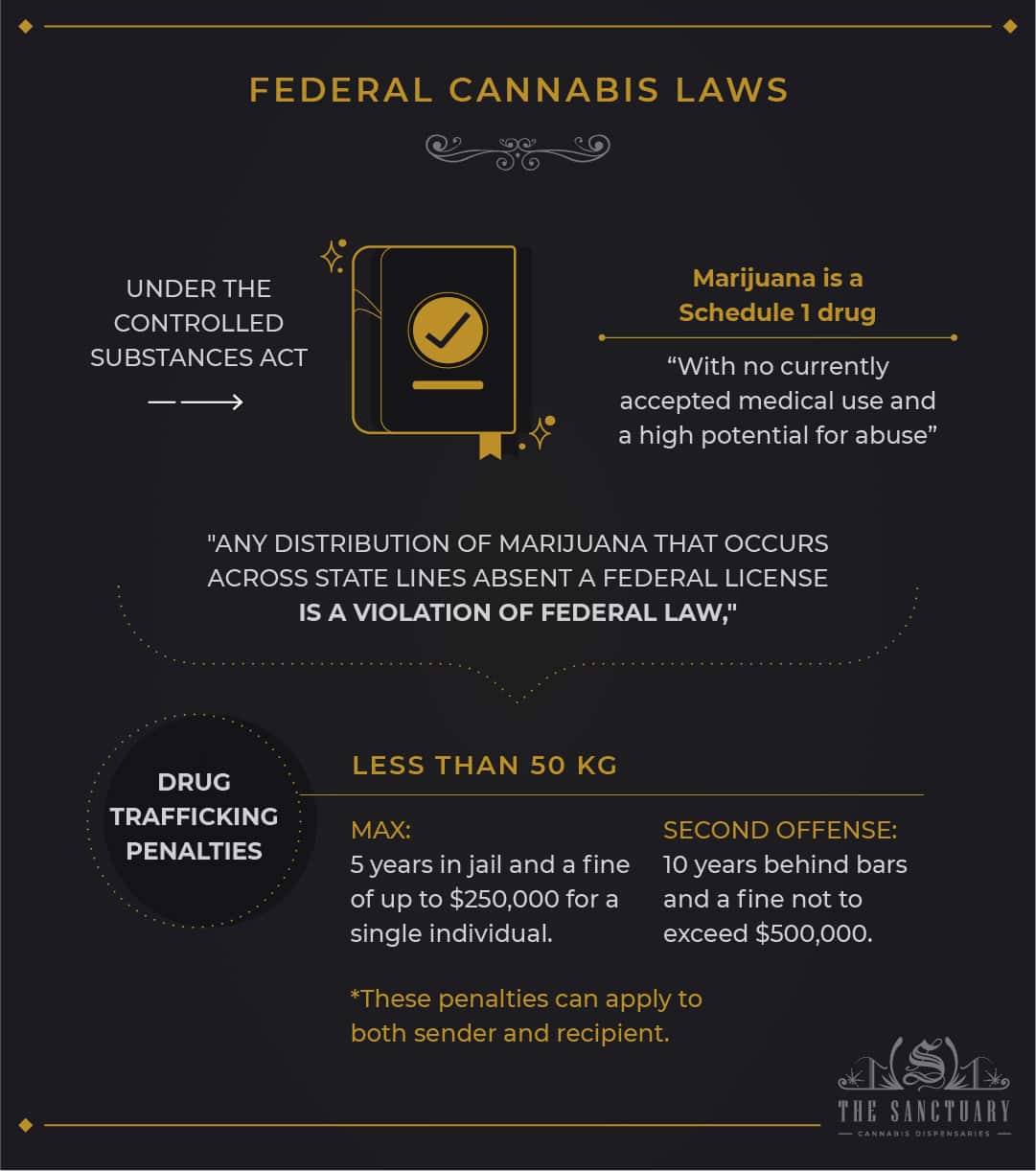Iftikhar Alam
Author
Reviewed by Cannabis Experts
Published on: February 8, 2021 | Updated on: November 16, 2024
Sweeping prohibition reforms have been changing the way people across the United States purchase cannabis. Shopping online for weed is as easy as ordering a pair of earrings. However, do not expect it to come through the mail.
When weed became legal, many people wondered, “Can you legally mail weed?” Well, the blunt answer is NO.
Despite the presence of states with regulated weed, it is illegal everywhere in the United States to send or receive weed through the mail. The USPS falls under federal jurisdiction, so it adheres to federal rather than state laws.
In recent years, third-party carriers like FedEx and UPS have been indicted for conspiracy to distribute controlled substances. While these cases did not involve cannabis, it gave them the incentive to monitor and prevent the shipping of all drugs.
History
Under federal law, the current legal status of cannabis is that it is classified as a Schedule I controlled substance under the CSA.
This means it has a high potential for abuse and is not accepted for medical use on the federal level. Hence, any kind of possession, sale, or distribution of marijuana or its constituents stays illegal under Federal law.
Since the 2013 Cole Memo, the federal government has given the states that have legalized cannabis a free hand as long as they adhere to specific guidelines.
The guidelines prevent the distribution of marijuana to minors and its sales across the state; however, in 2018, the Cole Memo was revoked.
Federal Cannabis Laws

Under the Controlled Substances Act, which was signed into law by President Richard Nixon in 1970 to regulate the manufacture, possession, and use of certain drugs, marijuana is a Schedule 1 drug. According to the Drug Enforcement Agency, Schedule 1 drugs are those “with no currently accepted medical use and a high potential for abuse,” such as heroin, LSD, and ecstasy.
“Any distribution of marijuana that occurs across state lines absent a federal license is a violation of federal law,” Paul Armentano, deputy director of NORML, said. Drug trafficking penalties vary depending on the schedule of the drug being trafficked and the amount.
For less than 50 kilograms of marijuana (or from one to 49 marijuana plants), the maximum penalty for the first offense is up to five years in jail and a fine of up to $250,000 for a single individual. The maximum penalty for the second offense doubles: up to 10 years behind bars and a fine not exceeding $500,000.
These penalties can apply to both sender and recipient. In addition to the federal level, all state cannabis initiatives that passed include language prohibiting importing and exporting marijuana from the legal state.
Recent Developments
Recent discussions and proposals in Congress have been presented for decriminalizing and legalizing cannabis on a federal level, such as the Marijuana Opportunity Reinvestment and Expungement Act.
State Law
Different states have legalized cannabis for medical and recreational uses. Today, over 20 States, as well as the District of Columbia, have legalized the recreational uses of cannabis, and over 30 States already allow it for medical purposes.
Each State has its own set of regulations regarding the legal possession limit, age restrictions, licensing, and rules regarding the sale and distribution of cannabis.
Conflict in the Federal and State law
The legal status of cannabis still lies as a conflict between State and Federal laws. People can individually possess it in different states but may still have to pay Federal penalties for possessing or distributing it.
Can you legally mail weed? U.S. Postal Service Regulations
The United States Postal Service USPS bans mailing cannabis in any form. That includes its variants like seed plants or other products with THC, no matter what the state laws are.
The reason is that federal laws still classify cannabis as illegal.
As per the USPS regulation, any product that has cannabis or is derived from the same is a prohibited item and is treated no other than other illegal substances like heroin and cocaine.
Of course, this does not necessarily mean that people will not ship weed through the mail anyway. People mail weed very often. The United States Postal Service has stated that it confiscated 34,000 pounds of marijuana in 2015.
However, it does not mention how much they missed, but we can assume there was some. Would you get away with mailing weed from one legal state to another? Perhaps, but it is not worth the risk.
According to the U.S. News report, from 2015 to 2016, the number of packages containing cannabis products rose by over 18%. The significant increase in intercepted weed packages came after two years of decline. Non-cannabis drug mail, by contrast, increased 11.6% during the same period.
Consequences of Mailing Cannabis
Mailing cannabis can lead to serious legal consequences like criminal charges and confiscation. Individuals spotted mailing cannabis can face criminal charges under federal law, leading to fines or imprisonment.
Also, even if the contents are suspected of containing cannabis, they can be seized.
Although the USPS doesn’t have to inspect each package, it still has the authority to do so. If it suspects illegal activity, it will report it to law enforcement agencies.
So even though mailing cannabis is illegal under federal law, there are specific alternatives you can try to send the same.
You can check out different legal dispensaries that offer delivery services and are licensed for the legal distribution of cannabis. Or you can try certain third-party apps for services that connect you with the local dispensaries and customers so they can get cannabis while at home.
How Can You Legally Mail Weed?
New guidelines from the US Postal Service reveal the federal agency will now ship and deliver some cannabis products, specifically hemp products.
The 2014 and 2018 Farm Bills federally permitted and expanded hemp cultivation throughout the US in states that legalized weed. The guidelines state the USPS will only handle cannabis products made from hemp that contains less than 0.3% THC.
Hemp is a form of cannabis that contains negligible amounts of THC, so it cannot get anyone high. In recent years, its cultivation has grown popular in the US for extracting CBD, a non-intoxicating compound with medicinal properties.
Of course, the US government does not make mailing hemp products easy. First, to ship hemp or hemp products through the USPS, mailers must fill out a form confirming they are sending hemp and only hemp. Lying on the self-certification statement could subject the mailer to federal perjury laws. Second, only licensed industrial hemp producers can mail hemp products.
Conclusion
A fair answer to the question, can you legally mail weed, is hugely dependent on the stage you are in and its laws. While marijuana is legal in some states, it is still federally an illegal substance that can’t be mailed.
So always exercise caution and adhere to the laws whether you are thinking of ordering or sending out weed or its products via mail.
The content provided on this blog is for informational purposes only and does not constitute medical, legal, or professional advice. Cannabis use is subject to local laws and regulations, which vary widely by jurisdiction. Always consult with a healthcare professional before starting any new treatment or altering an existing treatment regimen. The authors and publishers of this blog are not responsible for any actions taken based on the information provided herein. Use cannabis responsibly and in accordance with applicable laws. This blog is intended for adults aged 21 and over. The Sanctuary Dispensaries D186, D187.








